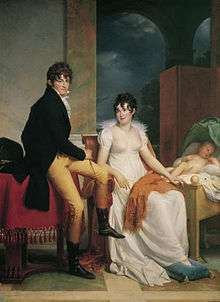Count Moritz von Fries

Moritz Christian Johann Reichsgraf von Fries (born 6 May 1777 in Vienna; died 26 December 1826 in Paris) was an Austrian nobleman, banker and patron of the arts.
His father Johann von Fries was one of the richest men in the Austrian Empire, thanks to many successful financial and industrial ventures. In 1800, at the time when Moritz von Fries married Princess Maria Theresa zu Hohenlohe-Waldenburg-Schillingsfürst he owned 80% of the family bank, which was itself worth 2.5 million guilders. However, this was the height of von Fries' social and financial success, as the inflation and other economic troubles of the Napoleonic Wars coupled with the vast expenses of his standard of living progressively eroded his fortune. By 1826 von Fries was bankrupted, and moved to Paris with his second wife, dying shortly thereafter. His children were left penniless.
Today, von Fries is principally remembered for his patronage of the musical life of Vienna. A member of the Gesellschaft der Associierten Cavaliere, an association of noblemen that organised exclusive concerts with the leading musicians of the day, he also organised many private concerts and musical soirees, where he supported many musicians and composers, most notably Joseph Haydn, Ludwig van Beethoven and Franz Schubert. Haydn's oratorio The Creation was performed at the family residence, the Palais Fries, in April 1800, and Haydn also dedicated his last, unfinished, string quintet to von Fries.
It was at one of Fries's soirees that Beethoven had his famous encounter with the his rival virtuoso Daniel Steibelt. Beethoven dedicated two piano and violin sonatas, Op. 23 and Op. 24, to Fries, in return for his financial support. Von Fries inadvertently compromised the publication of these sonatas - Beethoven had arranged that, as their sponsor, the sonatas would be supplied to von Fries in manuscript for his exclusive enjoyment for a year prior to putting them to press. However, von Fries was tricked into supplying these manuscripts to the publisher Artaria, who immediately brought out a 'pirated' edition without Beethoven's permission. However, this error was evidently not fatal to Fries's relationship with Beethoven, who went on to dedicate his Op. 25 quintet and his Seventh Symphony to him.
As well as an admirer of music, Von Fries was a collector of both books and art. His art collection (which he inherited from his brother Johann and then substantially expanded) included over 300 works, including those by Raphael, van Dyck and Rembrandt, and his library extended to over 2,000 books. However, this extensive collection was all sold for the benefit of his creditors after his bankruptcy.
Sources
Peter Sheppard Skaeverd, "BEETHOVEN-SONATAS OP 23 AND OP 24"
| Wikimedia Commons has media related to Moritz von Fries. |